delete this->m_EmpArr[i];//删掉指针指向的堆区对象 清除指向的内存数据
this->m_EmpArr[i] = nullptr;//清空指针本身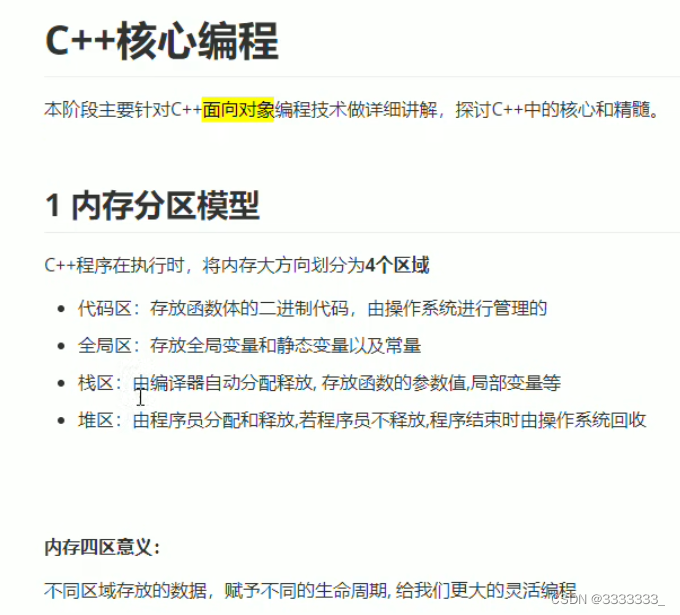
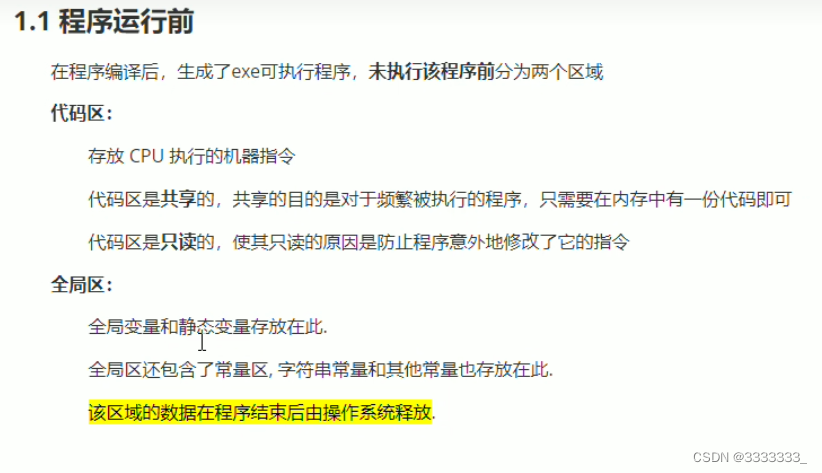

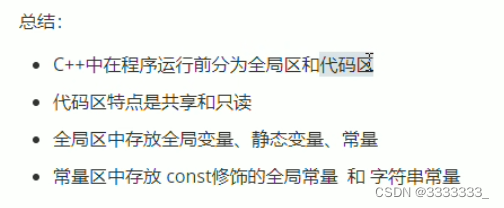


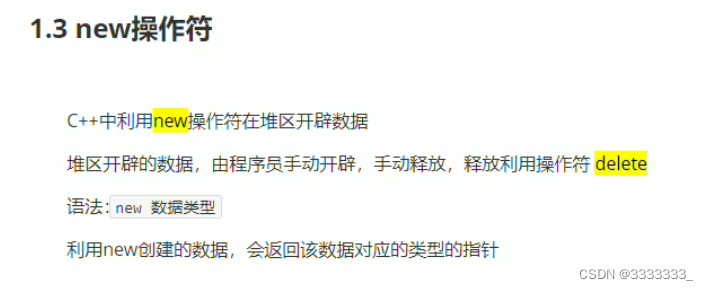
#include <iostream>
using namespace std;
int *func() {
//在堆区创建整型数据
//new返回是 该数据类型的指针
// return new int(10);
int *p = new int(10);
return p;
}
void test1() {
int *p = func();
cout << *p << endl;
//堆区的数据 由程序员管理开辟 程序员管理释放
//如果想释放堆区的数据,利用关键字delete
delete p;
// cout << *p << endl;//内存已经释放,再次访问就是非法操作,报错
}
void test2() {
//创建10整型数据的数组,在堆区
int *arr = new int[10];//10代表数组有10个元素
for (int i = 0; i < 10; i++) {
arr[i] = i + 100;
}
for (int j = 0; j < 10; j++) {
cout << arr[j] << endl;
}
//释放堆区数组
//释放数组的时候,要加[]才可以
// delete arr;//不报错,但是有提示 'delete' applied to a pointer that was allocated with 'new[]'; did you mean 'delete[]'? allocated with 'new[]' here
delete[] arr;
}
int main() {
//new的基本语法
test1();
cout << endl;
//在堆区利用new开辟数组
test2();
return 0;
}
10
100
101
102
103
104
105
106
107
108
109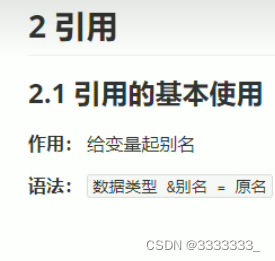
#include <iostream>
using namespace std;
int main() {
//引用基本语法
//数据类型 &别名 = 原名
int a = 10;
//创建引用
int &b = a;
cout << "a=" << a << endl;
cout << "b=" << b << endl;
b = 100;
cout << "a=" << a << endl;
cout << "b=" << b << endl;
return 0;
}
a=10
b=10
a=100
b=100
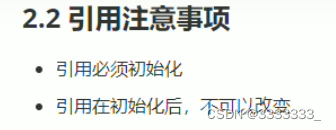
#include <iostream>
using namespace std;
//1 引用必须要初始化
//int &b;//错误的
//2 引用一旦初始化后,就不可以更改引用
int main() {
int a = 10;
//1 引用必须要初始化
//int &b;//错误的
int &b = a;
//2 引用一旦初始化后,就不可以更改了
int c = 20;
b = c;//赋值操作,而不是更改引用
cout << a << endl;
cout << b << endl;
cout << c << endl;
return 0;
}
20
20
20

引用传递
#include <iostream>
using namespace std;
void swap(int &a, int &b) {
int temp = a;
a = b;
b = temp;
}
int main() {
int a = 10;
int b = 20;
cout << a << endl;
cout << b << endl;
swap(a, b);
cout << a << endl;
cout << b << endl;
return 0;
}
10
20
20
10
总结:通过引用参数 产生的效果同按地址传递是一样的,引用的语法更清楚简单
#include "iostream"
using namespace std;
//1 不要返回局部变量的引用
//int &test1() {//编译器有 warning reference to local variable 'a' returned [-Wreturn-local-addr]
// int a = 10;//局部变量放在四区中的栈区
// return a;
//}
//2 函数的调用可以作为左值
int &test2() {
static int a = 10;
return a;
}
int main() {
//引用做函数的返回值
// int &ref = test1();//报错
// cout << ref << endl;//报错
int &ref = test2();
cout << ref << endl;
cout << ref << endl;
cout << ref << endl;
test2() = 1000;//如果函数的返回值是引用,这个函数调用可以作为左值
cout << ref << endl;//ref是别名
cout << ref << endl;
cout << ref << endl;
return 0;
}
10
10
10
1000
1000
1000引用本质是指针常量

#include "iostream"
using namespace std;
//发现是引用,转换为 int* const ref=&a;
void func(int &ref) {
ref = 100;//ref是引用,转换为*ref=100
}
int main() {
int a = 10;
//自动转换为 int* const ref = &a;指针常量是指针指向不可改,也说明了为什么引用不可以更改
int &ref = a;
ref = 20;//内部发现ref是引用,自动帮我们转换为*ref=20
cout << "a=" << a << endl;
cout << "ref=" << ref << endl;
return 0;
}
a=20
ref=20常量引用
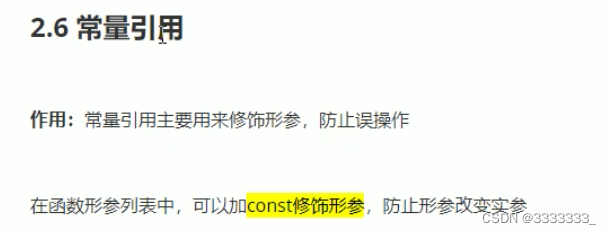
#include "iostream"
using namespace std;
void printInfo(int &val) {
val = 101;
cout << val << endl;
}
void printInfo2(const int &val) {
// val = 101;//不能修改
cout << val << endl;
}
int main() {
//常量引用
//使用场景:用来修饰形参,防止误操作
int a = 10;
int &ref1 = a;//对的
// int &ref2 = 10;//错误 引用必须引一块合法的内存空间
//对的,加上const之后,编译器将代码修改 int temp = 10; const int &ref3 =temp;
const int &ref3 = 10;
ref1 = 20;//可以修改
// ref3 = 20;//不可以修改,加入const之后变成只读,不可以修改
int b = 100;
printInfo(b);
cout << b << endl;//变成了101,被修改了
cout << endl;
int b2 = 100;
printInfo2(b2);
cout << b2 << endl;//不变
return 0;
}
101
101
100
100





















 191
191











 被折叠的 条评论
为什么被折叠?
被折叠的 条评论
为什么被折叠?








